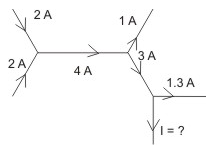1. A wire of resistance 20 Ω is drawn so that its diameter becomes 1/5th. Its resistance will be now
A. 10 Ω
B. 25 Ω
C. 50 Ω
D. 500 Ω
2. The current I in the electric circuit shown is

A. 1.7 A
B. 1 A
C. 2.7 A
D. 3.7 A
3. A node in a circuit is defined as a
A. closed path
B. junction of two or more elements
C. group of interconnected elements
D. open terminal of an element
4. Electrical resistivity is
A. Low for copper and high for alloy
B. High for copper and low for alloy
C. Low for copper as well as for alloy
D. high for copper as well as for alloy
5. What is the Power consumed by the resistor of 20 Ω connected across 100 V source?
A. 500 W
B. 50 W
C. 100 W
D. 300 W
6. An electrical heater draws 3.5 A from a 110 V source. The resistance of the heating element is approximately
A. 385 Ω
B. 38.5 Ω
C. 3.1 Ω
D. 31 Ω
7. An ideal voltage source should have
A. large value of emf
B. small value of emf
C. zero source resistance
D. infinite source resistance
8. A linear circuit is one whose parameters (e.g. resistance)etc.
A. change with change in current
B. change with change in voltage
C. does not change with voltage and current
D. none of these
9. One Joule per coulomb is called?
A. volt
B. ampere
C. farad
D. Gauss
10. To determine the value of the net resistance (R) for three parallel resistors R1, R2, and R3, we can use the following equation
A. R=R1+R2+R3
B. R=1/R1+1/R2+1/R3
C. 1/R=1/R1+1/R2+1/R3
D. 1/R=R1+R2+R3
